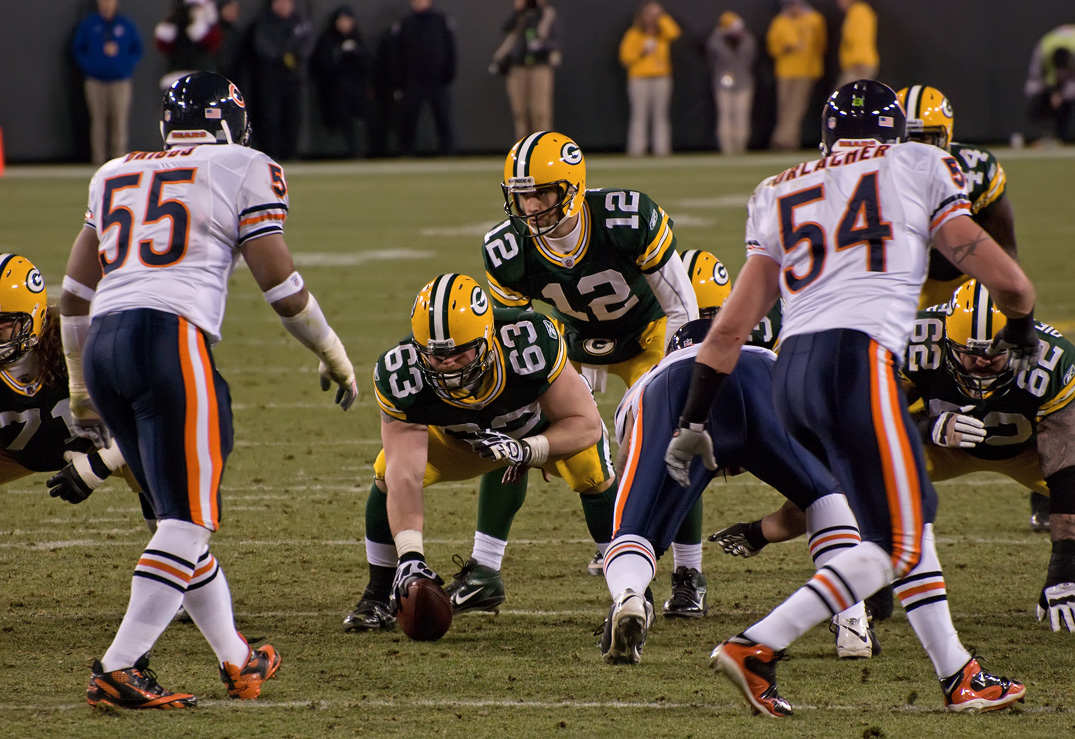
Bears–Packers rivalry
The Bears–Packers rivalry is a National Football League (NFL) rivalry between the Chicago Bears and the Green Bay Packers. The two teams have a combined 70 members in the Pro Football Hall of Fame (37 for Chicago and 33 for Green Bay), have won a combined 22 NFL championships (13 for Green Bay and 9 for Chicago, first and second place among all NFL teams), and includes five Super Bowl championships (four for Green Bay and one for Chicago). They hold the top two spots for most wins all-time; the Bears had the record from 1921 until 2022, when the Packers took over in a game between the two teams, who were tied at 786 wins going into the game.[1][2][3][4][5][6][7][8]
They are two of the oldest teams in the NFL.[9][10] The Bears were founded as the Decatur Staleys, a works team of the A. E. Staley Manufacturing Company, in 1919; they turned professional in 1920 and joined the American Professional Football Association (APFA), forerunner of the NFL, as a charter member later that same year, then moved to Chicago in 1921 and becoming the Bears in 1922. The Packers were founded similarly in 1919, sponsored by first the Indian Packing Company, then the Acme Packing Company, and joined the APFA in 1921. The Packers currently have the most wins in NFL history.[11]
The rivalry began in 1921 and is the league's most played, with 208 regular-season and post-season games.[12] It has been renewed annually in all but two seasons since 1921. They were not scheduled to play each other in 1922 and both meetings were canceled in 1982 due to the NFLPA strike, making the Lions–Packers rivalry the longest continuous rivalry in the NFL (the Packers and Detroit Lions have played each other at least twice a season since 1932).[13]
The Packers and Bears have played in the same conference or division since the NFL went to a conference format in 1933. They played in the NFL's Western Conference from 1933 to 1970, and have been in the NFC North since 1970 (known as the NFC Central from 1970 to 2001). As such, they have usually played each other twice every regular season since 1933, except for the 1982 strike. It is the most historic NFC North rivalry. The Bears held the winning record against the Packers for many decades, at one point, having led the series by as many as 24 games (in 1960 and again in 1992). The Packers surpassed the Bears in 2017 and now lead the series, 107–95–6. The Bears and Packers have met twice in the NFL playoffs, with the Bears winning a 1940 divisional round playoff game 33–14 and the Packers winning the 2010 NFC Championship Game 21–14.[14][15]
Since 1992, the Packers have dominated the rivalry with a 50–15 record against Chicago, including the aforementioned 2010 NFC Championship Game.[16][17]
The Bears and Packers have made it to the playoffs in the same year five times:
Other rivalries involving the two teams